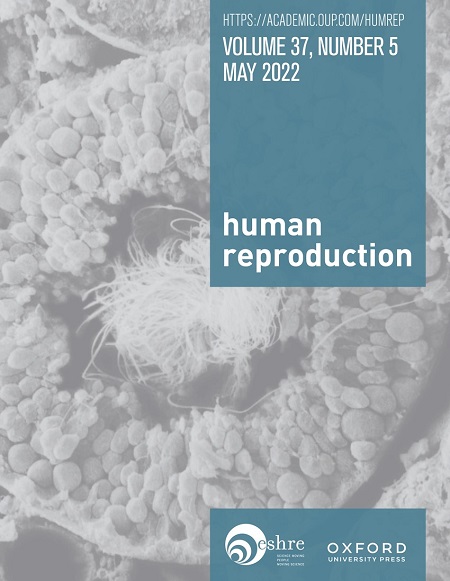P-735 Regional Trends in Licensing and Certification of Clinical Embryologists: Insights from a Cross-Sectional Analysis
IF 6
1区 医学
Q1 OBSTETRICS & GYNECOLOGY
引用次数: 0
Abstract
Study question Does national licensing influence the likelihood of clinical embryologists obtaining ESHRE certification? Summary answer Licensing for embryologists in Europe is associated with a higher likelihood of pursuing ESHRE certification, a pattern not observed in regions such as Arab countries. What is known already The demand for clinical embryologists has increased due to the growing complexity of IVF cycles and staffing requirements. However, professionalism varies significantly across countries, with differences in training, recognition, and regulatory frameworks. Few studies have examined workforce regulations, with only one mapping European nations, revealing limited mandatory licensing. Since its introduction in 2008, ESHRE certification—enhanced by a proctored exam since 2021—has become the first standardized credential. Given these disparities, it is essential to assess whether national regulations influence clinical embryologists' pursuit of ESHRE certification as a means of validating expertise and enhancing professional recognition. Study design, size, duration This cross-sectional, cross-regional study examines the relationship between national licensing regulations and ESHRE certification among clinical embryologists in European and Arab countries. Primary data is collected through a survey of key informants across 17 Arab countries to assess licensing status. Secondary data includes literature-based licensing information for European countries. Both datasets are cross-matched with the number of ESHRE-certified embryologists listed on the ESHRE website up to 2024, providing a comprehensive regional comparison. Participants/materials, setting, methods Purposeful selection of key informants was employed to ensure expert sampling across 17 Arab member states. The questionnaire covered various aspects of national regulations governing clinical embryologists. For European countries, national regulatory data was extracted from the PubMed database. The number of ESHRE-certified embryologists was obtained from the ESHRE website, including those certified up to the 2024 cycle. Associations between certification and regulatory frameworks were examined within each region. Main results and the role of chance Among the 17 Arab countries analyzed, 7 have explicit national licensing frameworks for embryologists. A total of 64 ESHRE-certified embryologists were identified in this region. No statistically significant difference was found in the number of ESHRE-certified embryologists between licensed (38) and non-licensed countries (26) (Mann-Whitney U test, p = 0.959). However, licensed Arab countries had a slightly higher mean number of certified embryologists compared to non-licensed countries. Conversely, findings from 12 European countries showed an opposite trend. Among these, eight countries have established national licensing frameworks for embryologists, with a total of 753 ESHRE-certified embryologists in licensed countries. A statistically significant difference was observed between licensed (325) and non-licensed countries (428) (Mann-Whitney U test, p = 0.048), indicating a higher prevalence of certified embryologists in countries with regulatory frameworks. When analyzing ESHRE certification numbers from 2021 onward, after the transition to a proctored exam format, the same trends persisted, reinforcing the observed associations between national licensing and ESHRE certification in both regions. Limitations, reasons for caution This study is limited by self-reported data bias, small sample sizes in some groups, and reliance on secondary sources for European licensing data. Additionally, it does not account for potential confounding factors that may influence the findings. Wider implications of the findings Regulatory policies, professional mobility, career incentives, and certification accessibility warrant further investigation to better understand global disparities in the clinical embryology workforce. Trial registration number NoP-735临床胚胎学家许可和认证的区域趋势:来自横断面分析的见解
国家许可会影响临床胚胎学家获得ESHRE认证的可能性吗?在欧洲,胚胎学家获得许可与获得ESHRE认证的可能性更高有关,这一模式在阿拉伯国家等地区没有观察到。由于体外受精周期和人员需求的日益复杂,对临床胚胎学家的需求有所增加。然而,各国的专业精神差异很大,在培训、认可和监管框架方面存在差异。很少有研究对劳动力法规进行考察,只有一项研究对欧洲国家进行了测绘,揭示了有限的强制性许可。自2008年推出以来,ESHRE认证(自2021年起加强监考)已成为首个标准化证书。鉴于这些差异,有必要评估国家法规是否会影响临床胚胎学家对ESHRE认证的追求,将其作为验证专业知识和提高专业认可度的一种手段。这项横断面、跨区域的研究考察了欧洲和阿拉伯国家临床胚胎学家的国家许可法规与ESHRE认证之间的关系。主要数据是通过对17个阿拉伯国家的关键线人的调查收集的,以评估许可状况。次要数据包括欧洲国家基于文献的许可信息。这两个数据集与ESHRE网站上列出的截至2024年的ESHRE认证胚胎学家数量交叉匹配,提供全面的区域比较。参与者/材料,设置,方法有目的地选择关键线人,以确保在17个阿拉伯成员国进行专家抽样。调查问卷涵盖了管理临床胚胎学家的国家法规的各个方面。对于欧洲国家,国家监管数据是从PubMed数据库中提取的。通过ESHRE认证的胚胎学家的数量从ESHRE网站获得,包括那些通过认证到2024周期的胚胎学家。在每个区域内审查了核证和管制框架之间的联系。在分析的17个阿拉伯国家中,有7个国家对胚胎学家有明确的国家许可框架。该地区共有64名获得eshre认证的胚胎学家。获得eshre认证的胚胎学家数量在获得eshre认证的国家(38名)和未获得eshre认证的国家(26名)之间无统计学差异(Mann-Whitney U检验,p = 0.959)。然而,有执照的阿拉伯国家与没有执照的国家相比,有执照的胚胎学家的平均人数略高。相反,来自12个欧洲国家的调查结果显示出相反的趋势。其中,8个国家已经建立了胚胎学家的国家许可框架,在获得许可的国家共有753名eshre认证的胚胎学家。在获得许可的国家(325个)和未获得许可的国家(428个)之间观察到统计学上显著的差异(Mann-Whitney U检验,p = 0.048),表明在有监管框架的国家,获得认证的胚胎学家的患病率更高。在分析2021年以后的ESHRE认证数量时,在过渡到监考考试形式之后,同样的趋势仍然存在,加强了两个地区国家许可和ESHRE认证之间观察到的联系。本研究的局限性在于自我报告的数据偏倚,一些组的样本量较小,以及依赖于欧洲许可数据的二手来源。此外,它没有考虑到可能影响研究结果的潜在混杂因素。监管政策、专业流动性、职业激励和认证可及性需要进一步调查,以更好地了解临床胚胎学劳动力的全球差异。试验注册号
本文章由计算机程序翻译,如有差异,请以英文原文为准。
求助全文
约1分钟内获得全文
求助全文
来源期刊

Human reproduction
医学-妇产科学
CiteScore
10.90
自引率
6.60%
发文量
1369
审稿时长
1 months
期刊介绍:
Human Reproduction features full-length, peer-reviewed papers reporting original research, concise clinical case reports, as well as opinions and debates on topical issues.
Papers published cover the clinical science and medical aspects of reproductive physiology, pathology and endocrinology; including andrology, gonad function, gametogenesis, fertilization, embryo development, implantation, early pregnancy, genetics, genetic diagnosis, oncology, infectious disease, surgery, contraception, infertility treatment, psychology, ethics and social issues.
 求助内容:
求助内容: 应助结果提醒方式:
应助结果提醒方式:


